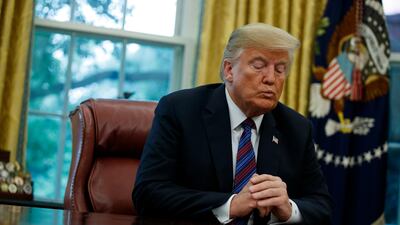Trade wars may not be as dramatic as real wars, but they are also destructive, and more insidious. Markets seem relatively unconcerned, despite the escalation of US-China rhetoric and imposition of tariffs. The prospect of rising trade barriers contains some opportunities for the Middle East, but also challenges.
Donald Trump has said that the US would leave the World Trade Organisation unless it “shapes up”. In March, he imposed a 25 per cent tariff on steel and a 10 per cent tariff on aluminium imports. US trade representative Robert Lighthizer has announced that, from late September, $200 billion worth of Chinese imports, including food, minerals, chemicals and consumer goods, face a 25 per cent tariff. Beijing has announced it would respond proportionately.
For now, China has refrained from imposing a threatened 25 per cent tariff on US crude oil imports, but has imposed the tariff on liquefied natural gas (LNG) imports. China took 17 cargoes of American LNG in January-May this year, one cargo in June and none in July. Chinese buyers have also shunned US oil in August, after buying 300,000 barrels per day in June and July, because of fears that tariffs might be imposed while they are waiting for a tanker-load to arrive.
Since the US exported $188bn of goods and services to China last year, while importing $524bn, if China is to retaliate fully against the threatened US tariffs, it will have to slap duties on a major category such as oil. The EU, Canada and Mexico have also announced retaliatory tariffs, though these do not yet include energy. The GCC does not sell much to the US, apart from oil, but $1.8bn of aluminium was its second-most important export.
The US’s agenda of “energy dominance” will suffer if it can not access a key expanding market such as China, hampering further growth in output. The duties on aluminium and steel already raise costs for American oil producers and pipeline companies. US oil and gas would be dumped in other countries, creating an opening for Middle Eastern exporters to win market share in the Middle Kingdom.
_________________
Read more:
US and Canada to resume Nafta talks despite Trump inflammatory remarks
Trade war threats get real as US and China impose tariffs
Trade war effects will only take shape in August
IMF says global growth to slow in medium term as it warns of trade war harm
_________________
The GCC might also benefit from cheaper food as Chinese and American farmers look for other markets. And if Chinese investment becomes less welcome in key destinations such as the US, Canada, the UK and Australia, Gulf money – which comes with less political baggage - will be needed.
Any moderate gains in the Middle East’s energy revenues, though, pale beside the negative impact of tariffs on the world economy. It is unlikely a trade war would cause a recession on its own, but it could be the negative shock that combines with other factors, such as a Chinese slowdown, contagion from Turkey’s crisis, rising interest rates, an oil price spike driven by lost output from Iran and Venezuela, and the natural end of a long economic expansion.
Just a 1 per cent drop in world economic growth could cut demand forecasts by 600,000 barrels per day or so, presenting Opec with the tricky task of reinstating its production cuts and potentially attracting more blame for keeping prices too high.
A general turn to protectionism would also be bad news for the region’s diversification efforts. Periodic complaints by competitors over below-market price inputs to petrochemical firms, and unfounded allegations of subsidies to airlines such as Emirates and Etihad, have been dismissed so far, but could return in a more insular world.
To head off the prospect of restrictive trade measures, the Middle East needs to step up its diplomatic efforts. The GCC launched negotiations for a free trade agreement (FTA) with the EU in 1990, but talks were suspended in 2008. Dialogue continues on long-awaited FTAs with China and India.
The Middle East lags behind other parts of the globe when it comes to free trade pacts as a region. The Greater Arab Free Trade Area has broad coverage but no enforcement mechanism. The World Bank’s recent Arab Competitiveness Report, points to a lack of trade integration, particularly from non-tariff barriers such as varying regulations and informal prohibitions, as one of the region’s biggest problems.
Political problems and insecurity have hampered major cross-border projects, leading to wasteful duplication of similar infrastructure, and lack of connectivity such as international railways. In energy trade, very little gas or electricity flows from producers to nearby deficit markets. A few tentative steps, for instance to sell some of Egypt’s new gas surplus to Jordan, or electricity from Saudi Arabia and Kuwait to Iraq in return for Iraqi gas to Kuwait, just illustrate how much more could be done with sufficient political will.
The region’s giant national energy champions expand overseas into promising markets such as China and south-east Asia, but more needs to be done within the Middle East outside their home country. The joint venture between Adnoc and Saudi Aramco for India’s Ratnagiri refinery, Mubadala’s stake in Egypt’s Sumed oil pipeline, and Kuwait Petroleum Corporation’s investment in Oman’s Duqm refinery, are quite rare examples of cooperation.
The prospects of a trade war, or just a milder slowdown in international trade, is bad news for oil demand and for the Middle East’s economic diversification. The region may do best to stay out of the melee for now as the trade giants of the US, China and the EU fight. But it needs to safeguard its future by opening trade within and beyond the Middle East.
Robin M. Mills is CEO of Qamar Energy, and author of The Myth of the Oil Crisis


